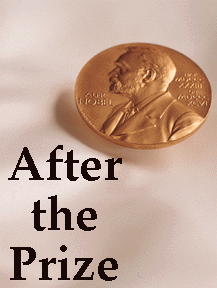

Seven men from the University of Washington--four professors and three alumni--have won the Nobel Prize. Bombarded by the media, showered with invitations and suddenly given thousands of dollars in prize money, the time of the announcement is a heady experience. But we wondered what happened next. Do you live happily ever after, both personally and professionally? Or should you be careful what you wish for, lest your dreams come true?
Columns tracked down the half-dozen UW laureates still living to find out. Our four faculty members continue to live in Seattle: Physics Professor Hans G. Dehmelt, who shared the 1989 prize in physics; Medicine and Oncology Professor Emeritus E. Donnall Thomas, who shared the 1990 prize in medicine for his work at the Fred Hutchinson Cancer Research Center; and Pharmacology and Biochemistry Professor Emeritus Edwin G. Krebs and Biochemistry Professor Emeritus Edmond H. Fischer, who together shared the 1992 in medicine.
Surprisingly, the two living alumni laureates live only a few miles apart in North Carolina: George H. Hitchings, `27, who shared the 1988 prize in medicine; and Martin Rodbell, `54, who shared the 1994 prize in medicine. Our first laureate, George J. Stigler, `31, who won the 1982 Nobel Prize in economics, died in 1991. [Editor's note: George H. Hitchings died on February 27, 1998, just a few days after this issue was printed.]
Each laureate had a distinct story to tell about the heady moment in early October (usually in the wee hours) when they first heard they'd won. Some were sure the phone call was a practical joke.
Once convinced it wasn't a prank, they endured numerous media interviews and press conferences leading up to the award ceremonies. Two months later, on Dec. 10, the anniversary of Alfred Nobel's death, Sweden's king presented them with their award in Stockholm.
Common themes wove throughout their stories. All felt that the blessings of the prize outweighed the burdens of celebrity, such as requests for autographs.
Contrary to certain stereotypes, they didn't shift their research toward "riskier" directions after receiving the prize. "I used to think that if you won the Nobel Prize, you should turn to the hardest problem of all: how people think. But I've decided that's a bit arrogant," says Krebs. "Instead, our research has continued to guide itself. As it reveals new things, and generates more questions than any one lab can work on, we choose which to follow."
Unlike some previous science laureates such as Linus Pauling and George Wald, UW prize-winners seemed wary of becoming public advocates for causes outside their own research.
"There's a stupid misconception that you should know everything about everything, just because you won the Nobel Prize in a given discipline," says Fischer. "The missionary spirit is just not my style."
Still, several held (and occasionally expressed) strong opinions on social concerns, including population control, disarmament, and access to education and health care. Some are members of organizations, including Physicians for Social Responsibility and the Union of Concerned Scientists.
They were particularly bemused by continual demands to predict the future: "When they give you the Nobel Prize, they don't hand out a crystal ball to go with it," says Thomas.
Common Experiences After the Award
George Hitchings, 1988 Prize in Medicine
Hans Dehmelt, 1989 Prize in Physics
E. Donnall Thomas, 1990 Prize in Medicine
Edwin Krebs, 1992 Prize in Medicine
Edmond Fischer, 1992 Prize in Medicine
Martin Rodbell, 1994 Prize in Medicine
Send a letter to the editor at columns@u.washington.edu.